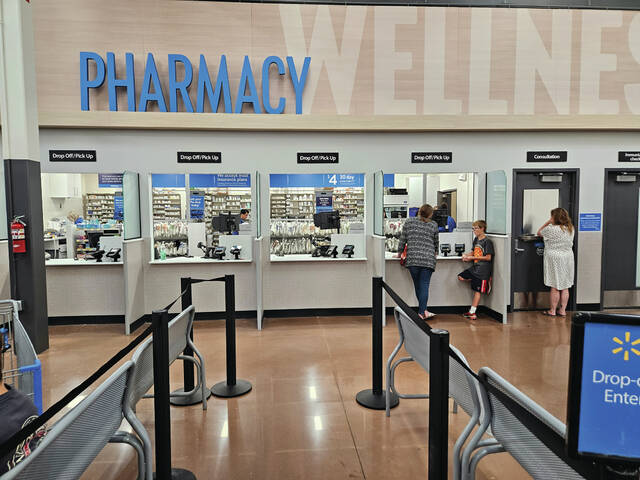
Customers who are waiting for their prescriptions at the Walmart Pharmacy in Dilworth, Minn.
(Photo by Rick Olson, special to the Devils Lake Journal)
FARGO, N.D. – Have you noticed the lack of a pharmacy counter at many of your favorite places to shop?
There is a reason why national chain pharmacies such as CVS, Walgreens, Walmart, and the others do not dot the landscape throughout North Dakota. The primary reason behind this is because North Dakota has a unique law on the books, which requires that pharmacies must be owned and operated by a licensed pharmacist in good standing. The law further requires that a pharmacist must own at least 51 percent of a pharmacy.
The pharmacy ownership law, as it has come to be known, has existed in North Dakota since 1963. At the time, it was proposed as a means to prevent physicians from selling prescription medications directly to their patients, thus cutting out the middleman of a pharmacist at a pharmacy from filling the prescription.
Instead, the law has had an entirely different effect. The law prevents any significant competition in the pharmacy industry in North Dakota. What the law has done is to give a state-sanctioned shield of protection to one single industry. The pharmacy industry. Over the last couple of decades or so, the subject of changing the pharmacy ownership law to allow some much-needed competition, has been stopped cold. Largely, by the pharmacists themselves.
North Dakota has several hundred independently owned pharmacies, which are located throughout the state. These pharmacist-owners enjoy the shield of protection against competition which the current law affords them. There have been at least three statewide efforts over the last many years to change the law.
A group which was known as North Dakotans for Affordable Healthcare brought forward an initiated measure in 2010 to change the law. While the group obtained the required number of petition signatures to put the measure on the 2010 general election ballot, Al Jaeger, who was the North Dakota Secretary of State at the time, threw out all of the signatures that had been collected due to the fact that a list of the names and addresses of the initiative’s sponsors were not circulated with the petitions that voters were asked to sign.
The group appealed Jaeger’s decision directly to the North Dakota Supreme Court, and in a unanimous ruling later that year, the court upheld the secretary of state’s decision, and the initiative did not appear on the ballot that year.
A separate initiated measure effort by North Dakotans for Affordable Healthcare in 2012 failed to obtain the required number of signatures, along with a lack of campaign funding, this resulted in the decision to terminate the initiated measure effort that year.
An effort to bring the matter before voters in 2014 finally succeeded. This time another group, North Dakotans for Lower Prescription Prices led the effort. However, in the ensuing general election in November of that year, nearly 60 percent of the voters in that election voted against the initiated measure. Supporters of the ballot measure to repeal the law believed that opening the pharmacy market to chain competitors would lower drug prices and improve patient access. Those who opposed the measure felt that it would hurt local businesses and independent pharmacies.
Fast forward to today. A private citizen from Fargo this past Winter proposed that the Legislature should take another look at the law. Unfortunately, no legislation was introduced during this year’s North Dakota legislative session.
It is my conclusion that the pharmacy ownership law is likely unconstitutional. I believe the law is an unconstitutional restraint of free interstate trade, in contravention with the U.S. Constitution.
While I am hopeful that someday the logjam on this issue can one day be broken, and that North Dakotans will be able to access lower prescription drug prices as a result; it also seems that this is so divisive of an issue that there may never be a change in this law to allow for this much needed competition.
Olson, of Fargo, is a published author of commentary and opinion articles in publications throughout the state. He is also a regular contributor to the Journal’s opinion page. Email him at [email protected]




